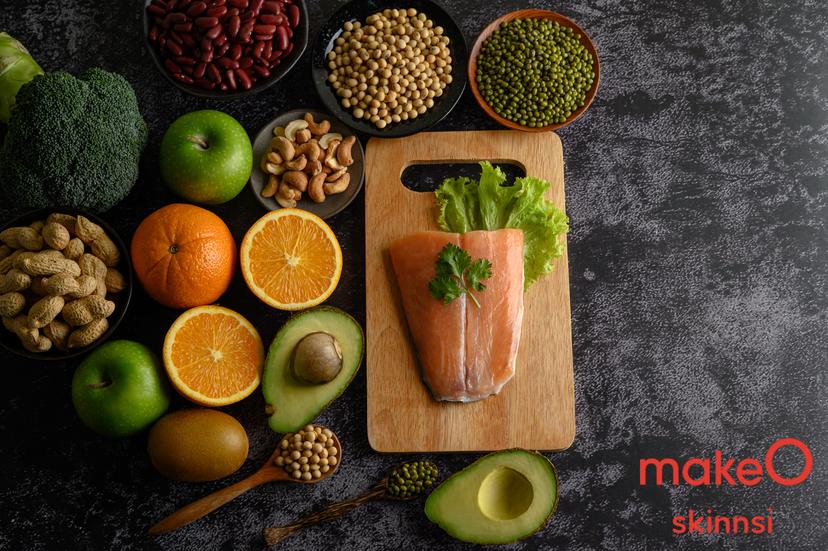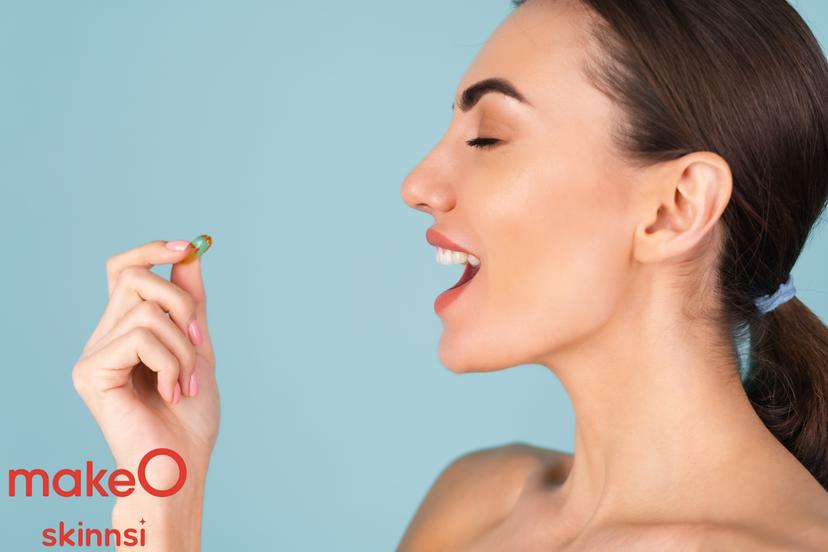MakeO blog
Wondering how to combat hair loss? DHT blockers could be the key. Dihydrotestosterone (DHT) is a hormone that can shrink hair follicles and cause thinning hair. In this article, you’ll learn how DHT blockers work and discover natural foods and alternatives to help maintain healthy hair.
Understanding DHT and Its Impact on Hair Loss
DHT, or dihydrotestosterone, is a potent androgen derived from testosterone through the action of the enzyme 5-alpha reductase. Approximately 10% of testosterone is converted into DHT, which plays various roles in the body, including affecting hair follicles. When DHT binds to androgen receptors on hair follicles, it can lead to follicle miniaturization, reducing hair growth and disrupting the hair growth cycle. This process can result in hair thinning and increased hair fall, particularly in areas prone to male pattern baldness.
High levels of DHT can significantly shorten the hair growth cycle, leading to faster hair shedding and reduced hair density. This is particularly problematic for individuals who are genetically predisposed to DHT sensitivity. These individuals have variations in their androgen receptor gene, making their hair follicles more susceptible to the damaging effects of DHT. As a result, they experience more pronounced hair thinning and hair loss compared to those with lower sensitivity.
Recognizing this genetic aspect is crucial for effectively addressing hair loss, as it requires the need for personalized treatment approaches.
How DHT Blockers Work
Natural DHT blockers aim to impede the conversion of testosterone into DHT by suppressing the 5-alpha reductase enzyme. By obstructing this transformation, these blockers cut down on DHT production and alleviate its adverse effects on hair follicles. Both synthetic drugs and natural substances utilize this strategy to reduce levels of DHT, thereby fostering more robust hair growth.
A variety of forms exist for obtaining DHT blockers—ranging from prescription drugs like finasteride and dutasteride, to over-the-counter products such as serums, hair mask along with dietary supplements.
Zinc plays an interesting role in suppressing the 5-alpha reductase’s function. This mineral is abundant in white mushrooms among other foods. Adding such nutrient-rich items dubbed ‘DHT blocker foods’ into one’s diet is another effective tactic against naturally preventing hair loss. Even though prescription medications are known to effectively decrease overall quantities of hormone, incorporating safe strategies with agents derived from nature often provide easier access. Hence, these DHT blocker foods are valuable assets for individuals aiming at maintaining their scalp health autonomously.
Top Natural DHT Blocker Foods
Rich in vital nutrient foods contribute to hormonal equilibrium and foster healthier hair growth patterns. Saw palmetto extract, pumpkin seeds, onions, green tea, and turmeric are all notable for their potential role in helping block DHT when added to regular diets.Their use not only targets a reduction in DHT levels but also enhances follicle quality which is crucial for maintaining overall health of the hair.
We will explore more deeply into these prime examples of natural DHT blocker foods. Understanding how specific nutritional components within these foods aid in inhibiting DHT production may influence your dietary decisions towards bolstering hair health.
Green Tea
The acclaimed health benefits of green tea also extends to the well-being of hair, as it plays a significant role in maintaining healthy hair. EGCG (epigallocatechin gallate), the principal compound found in green tea responsible for blocking DHT, works by inhibiting 5-alpha reductase. This action not only helps fight against hair loss, but also stimulates the follicles and enhances the overall cycle of hair growth.
Beyond its capacity to combat DHT production, green tea nourishes and safeguards your locks from damage. For those looking to reap maximum results from this natural remedy, consuming high-quality green tea or taking supplemental forms is advisable. Adopting a routine that incorporates these elements into your diet stands out as an effortless yet potent strategy for fortifying your hair’s health while countering potential loss effectively through nature’s means.
Pumpkin Seeds
Loaded with nutrients that promote hair health, pumpkin seeds are notably high in zinc. This mineral is crucial for curbing the production of DHT by inhibiting the 5-alpha reductase enzyme. Zinc also helps balance hormones, which is vital for preserving healthy hair follicles and avoiding hair loss.
Pumpkin seeds bring a wealth of antioxidants and additional elements that play a part in thwarting DHT creation. These nutritional components foster tissue growth and restoration within the hair, positioning pumpkin seeds as an advantageous dietary inclusion to fight against hair loss while encouraging healthier growth of your tresses.
Tomatoes
Thanks to their abundant lycopene content, tomatoes serve as an outstanding natural DHT blocker. This nutrient impedes the production of DHT by inhibiting the enzyme 5-alpha reductase, much like many medicinal DHT blockers do. By diminishing oxidative stress in hair follicles, lycopene is pivotal for fostering healthy hair growth.
The efficiency with which tomatoes block DHT can be heightened through cooking them. This process concentrates the lycopene making it more readily absorbable. To notably decrease levels of DHT and enhance hair health overall, including a minimum of two servings daily of foods rich in lycopene into your diet is beneficial.
Spinach
Spinach, a verdant and nutritious vegetable, is instrumental in thwarting DHT due to its richness in iron, magnesium, and zinc. These minerals are vital for maintaining hormonal equilibrium. Iron aids in oxygen distribution through the bloodstream, magnesium facilitates important biochemical reactions within the body, and zinc plays a pivotal role in regulating hormones—all of which contribute to diminishing DHT levels.
Henceforth, integrating spinach into meals is highly beneficial for those seeking ways to combat hair loss while fostering healthier strands of hair growth.
Almonds
Almonds play a vital role in promoting hair health thanks to their abundance of nutrients. The presence of biotin and zinc in almonds is instrumental in maintaining balanced androgen levels, which are key for fostering hair growth. By aiding the regulation of androgen production, biotin contributes significantly to this process.
Ingesting almonds brings together the benefits of biotin and zinc, thereby enhancing healthy hair growth through effective management of androgen levels while also acting as a defense against hair loss caused by DHT. Incorporating almonds into your diet provides a natural way to nourish your scalp with essential nutrients that support robust hair health.
Carrots
Carrots contain an abundance of vitamins A, C, K, and E that are crucial for maintaining the well-being of your hair. Vitamin C specifically. A plays a pivotal role in controlling the production of sebum, ensuring a healthy scalp environment which can help ward off hair loss related to elevated levels of DHT.
Incorporating carrots into your nutritional regimen provides essential nourishment that fosters more robust growth of hair while mitigating the effects caused by DHT. Carrots can be enjoyed in various forms such as raw snacks, cooked meals, or even as nutritious juices – making them a flexible and valuable component for diets aimed at preserving hair health.
Fruits
Incorporating a variety of fruits and vegetables into your diet can significantly promote hair growth and mitigate the effects of hair loss caused by DHT. These natural DHT blockers are packed with essential vitamins, minerals, and antioxidants that support healthy hair follicles and overall hair health.
Onion
Onions are particularly beneficial as they possess quercetin, an antioxidant, which has the potential to suppress the production of DHT by targeting alpha-5 reductase.
Coconut Oil
Coconut oil is acclaimed for its myriad health advantages, especially in the context of hair care. The presence of lauric acid within coconut oil plays a crucial role by obstructing the synthesis of DHT through hindering the activity of 5 alpha-reductase enzyme. Incorporating coconut oil into one’s nutrition or applying it directly to the scalp can bolster scalp vitality and mitigate inflammation.
The practice of gently rubbing coconut oil onto your scalp can fortify hair follicles while also enhancing overall scalp condition, which fosters healthier growth patterns for your hair. Exploiting both dietary consumption and topical application strategies harnesses the DHT blocking properties inherent in coconut oil, offering an adaptable approach to reap these benefits for improved hair well-being.
Turmeric
Curcumin, found in the widely acclaimed spice turmeric, can suppress DHT production. It achieves this by inhibiting alpha-5 reductase—the enzyme responsible for converting testosterone into DHT.
Incorporating turmeric into your dietary habits can serve as a natural strategy to lower the amount of DHT and help fight against hair loss. Whether you choose to enhance your dishes with turmeric or opt for supplementation, it stands as an effortless yet potent component in maintaining hair health.
Lifestyle Changes to Reduce DHT Levels Naturally
Altering certain aspects of your lifestyle can be instrumental in decreasing DHT levels and fostering the health of your hair. Ensuring adequate sleep, effectively dealing with stress, and keeping yourself well-hydrated are vital for diminishing DHT levels and nurturing healthy hair growth. Consuming a diet that is balanced plays an equally important role in supplying essential nutrients necessary to keep hormones regulated and mitigate hair loss.
In subsequent sections, we will explore crucial lifestyle modifications that assist in managing natural DHT concentrations. By integrating these habits into your day-to-day life, you have the opportunity to actively contribute to promoting healthier hair growth as well as enhancing overall health.
Regular Exercise
Consistent physical activity is crucial for maintaining hormonal equilibrium, which has a significant positive impact on hair health. Participating in cardiovascular and strength exercises can aid in harmonizing hormones, potentially reducing levels of DHT. Specifically, moderate aerobic workouts could help control hormone levels that are essential for healthier hair growth.
Frequent exercise not only helps regulate hormones, but also enhances blood flow and minimizes excess fat—all factors contributing to more robust hair growth. As such, incorporating regular movement into one’s routine forms an integral part of a comprehensive strategy geared towards nurturing the well-being of your hair.
Balanced Diet
Maintaining hair health requires a diet that is replete with crucial nutrients, as their lack can be detrimental to hair growth and lead to loss of hair. Crucial nutrients necessary for mitigating hair loss and fostering healthier strands include:
- Protein
- Zinc
- Iron
- Vitamin C
- Vitamin A
By ensuring these nutrients are adequately supplied in your diet, you stand a better chance at combating the issue of losing hair while encouraging more robust growth.
To ensure overall hormonal equilibrium, which favors healthy follicles, incorporating a diverse array of foods loaded with vitamins and minerals into one’s eating habits is essential. Not only does this help in lowering DHT levels that can impede hair development, but it also aids in nurturing an environment conducive to sustaining vigorous growth of healthy tresses.
Stress Management
It is vital to control stress in order to maintain equilibrium in DHT levels and bolster the overall health of your hair. Engaging in activities like yoga and meditation can significantly reduce stress hormones that cause an increase in DHT production. Adopting methods such as mindful deep breathing can aid in controlling stress, potentially affecting the production of DHT.
Incorporating techniques for managing stress into your everyday schedule helps decrease cortisol, diminishes DHT levels, and nurtures healthier hair growth. Controlling stress is crucial for averting hormonal imbalances that lead to hair loss, thereby serving as a critical component of a comprehensive strategy aimed at maintaining healthy hair.
Potential Side Effects of DHT Blockers
Utilizing DHT blockers can prove beneficial in the fight against hair loss, though they are not without potential risks. Those who choose to take these blockers should be cognizant of possible side effects such as sexual dysfunction and alterations in hormone levels. Continued use over an extended period may give rise to persistent health issues, including complications related to liver function.
Particularly for women, caution is advised when considering DHT blockers. With Spironolactone being one of the few specific options recommended. It’s important to note that maintaining reduced levels of DHT relies on consistent usage of these medications, and ceasing their application might result in a rebound to typical DHT concentrations.
In light of this information about possible adverse reactions, it becomes imperative for individuals contemplating the use of DHT blockers to fully grasp these implications so that they can make well-informed decisions regarding their treatment options for combating hair loss.
Alternatives to DHT Blockers
Individuals exploring various methods to address hair loss have multiple options beyond DHT blockers. Treatments using platelet-rich plasma, which is derived from the individual’s own blood and injected back into the scalp, are employed to promote hair growth. Microneedling has been found useful in increasing the absorption and thus potency of topical treatments for hair health.
While evidence regarding natural supplements like saw palmetto and green tea remains inconclusive regarding their impact on stimulating hair growth or halting hair loss, incorporating them poses minimal risk and may contribute positively as part of a holistic regimen dedicated to maintaining healthy hair.
If you're looking to achieve healthy, strong hair, makeO Skinnsi is here to help. Our expert solutions are designed to address a wide range of hair concerns, from hair thinning and damage to dryness and lack of volume. With personalized treatments and high-quality products tailored to your unique needs, makeO Skinnsi offers effective remedies to restore vitality, shine, and strength to your hair. Whether you're seeking professional guidance or advanced treatments, trust makeO Skinnsi to provide the care and expertise you need to achieve your healthiest hair. Reach out to us for all your hair-related concerns, and let our specialists help you find the perfect solution for beautiful, vibrant hair.
Summary
Grasping the significance of DHT’s role in hair loss is critical for effectively managing this issue. Utilizing natural DHT blockers, which encompass certain foods and lifestyle modifications, can be a comprehensive method to decrease DHT levels and foster healthier hair growth. Notable examples include green tea and pumpkin seeds along with tomatoes, spinach, and almonds. These coupled with habitual exercise, maintaining a nutritious diet, and handling stress well could greatly influence your hair health. Opting for natural solutions like natural DHT blockers over pharmaceutical options may offer a more benign route although it remains important to stay vigilant about any possible adverse reactions they might cause. By adopting such proactive measures conscientiously, you empower yourself to oversee your own hair wellness while naturally confronting the challenge of hair loss.
Frequently Asked Questions
What is DHT?
DHT, or dihydrotestosterone, is a hormone that is formed from testosterone and can cause notable hair loss when present in excess in both men and women. It is important to manage its levels to prevent adverse effects on hair health.
How does DHT affect hair follicles?
DHT negatively impacts hair follicles by binding to their receptors, resulting in follicle shrinkage, thinner hair, and ultimately hair loss. This process can significantly affect overall hair density and health.
What role does green tea play in reducing DHT levels?
Green tea effectively reduces DHT levels due to its content of epigallocatechin gallate (EGCG), which inhibits the enzyme 5-alpha-reductase responsible for converting testosterone into DHT. This mechanism demonstrates the potential of green tea in managing hormone-related conditions.
What nutrients in pumpkin seeds help block DHT?
Pumpkin seeds contain high levels of zinc, which helps inhibit DHT production, contributing to hair tissue growth and repair. Including them in your diet may support healthier hair by blocking DHT.
How can lifestyle changes help reduce DHT levels?
Adopting habits like regular exercise, stress control, and a well-rounded diet can be successful in lowering DHT levels and improving the condition of your hair. Placing importance on these routines may result in considerable advantages.
related categories
Related articles

Top Natural DHT Blocker Foods to Fight Hair Loss

Syphilis Hair Loss: What Young Adults Need to Know

Top Solutions for Relieving an Itchy Scalp

Biotin: Your Guide to Healthy Hair and Skin with Expert Tips

